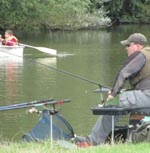The state of the countryside: fishing
Environmental issues are at the heart of predicting the future for fishing, says David Profumo


We fishermen tend to be a grumbly bunch-there's always something wrong that cheats us of victory. But last season saw such a bonanza for salmon anglers that many are still wearing a smile beneath their tweed caps.
Take the River Tweed itself: as I reported here in February, 2010 was a recordbreaking year (some 20,000 fish coming off the system), and these bumper results were mirrored elsewhere. The Thurso finished with three times its previous 10 years' average. More than 700 fish were taken off the Oykel in July alone. The Scottish total topped 100,000 salmon. There seemed to be fish running everywhere. Scientists on the Dorset Frome reported upstream migration in 2010 was at an 11-year high. ‘Why go abroad, when we have such fantastic fishing at home?' asks Robert Rattray, of CKD Galbraith. Even your humble correspondent managed his best ever season.
However, some feel the long-term view for our migratory stocks is still less than rosy. ‘I'm very gloomy about the future,' says Paul Knight, indefatigable CEO of the Salmon and Trout Association. He thinks environmental concerns, such as the ongoing threats from lice, pollution and escapees from marine fish farms, still come bottom of the political heap. ‘Aquaculture is a prime example. The unquestionable impact it's having on the environment is being ignored. I think we have serious problems on our overcrowded island.'
I tend to agree. One problem is that, although angling may be a broad church-there are said to be several million of us who enjoy it when the collection plate comes round, there are too few of us prepared to put our hands in our pockets to invest in the future of the sport.
The days may long be gone when a man apprehended for being on the streets at a suspiciously early hour of the day could exonerate himself by informing the magistrate ‘Sir, I am a roach fisher', but surveys suggest the pastime remains curiously close to the British heart with the great majority being ‘coarse' fishers. Yet, like the nation itself, perhaps, our sport has become fragmented. It's not just the usual subdivisions of coarse, game and sea-traditional weekend matches between company teams on canals and rivers are now on the wane.
Sign up for the Country Life Newsletter
Exquisite houses, the beauty of Nature, and how to get the most from your life, straight to your inbox.
According to Mark Lloyd, chief executive of the Angling Trust (AT), this is due to ‘the pollution of our rivers, the loss of large manufacturing industry, and the advent of private transport'. These matches have given way to sessions on heavily stocked, commercial stillwaters where there are no longer close seasons, and you can bag up on everything from catfish to sturgeon.
Most fanatical among the ‘speci' anglers are the carp hunters, who inhabit a tenebrous world of bivouacs and camouflaged gear (the incidence of divorce is rumoured to be particularly high among carpistas). Because cyprinids are canny, powerful, and can attain great size-the UK record stands at more than 60lb-they have become a cult species.
Rods carry warrior names such as Armalite or Longbow; terminal tackle has become hugely intricate (involving tungsten putty, hair-rigged hooks and swim-feeders); groundbait is sometimes delivered into a swim via remote-controlled model boats, and may be flavoured with tuna, silkworm chrysalis or tutti-frutti. Old-school hook-baits such as lobworm or potato have been replaced by high-protein ‘boilies' that would do credit to Heston Blumenthal. And to think that dyed maggots were once considered outlandish.
Hefty individual specimens are caught repeatedly, and acquire sobriquets such as Two Tone or Bubba. Some infidels, however, think that going after such fish by sleeping for several nights in a tent, rods rigged up to electronic bite alarms, is taking the sport in the direction of a video game. We may not yet stock municipal swimming pools (like the Japanese), but an all-indoor trout fishery has recently opened in Holland-how much more artificial will we get?
Perhaps such innovations will help to lure youngsters from the blandishments of the Great Indoors. Certainly, fewer are trying the sport. Disturbingly, the AT has encountered ‘considerable resistance from some schools who worry about health and safety, and the perceived cruelty of the sport'. Certain councils are obstructive, too. Although the major parties have pledged their support for a pastime that contributes some £3.5 billion annually to the economy (and is surely worth many votes), precious little is being done by Government to ensure its future.
Angling bodies continue to address environmental issues that threaten the health of our waterways. These range from abstraction and pollution to the spread of invasive alien species such as Japanese knotweed and signal crayfish-the latest little monster is the ‘Killer Shrimp' (aptly named Dikerogammarus villosus). There is widespread concern about the decline in our riverine fly life. Fishermen get little credit for tackling such issues.
Some lucky anglers continue to seek sport further afield. Iceland is fashionable once again, as is Norway, and elsewhere there are fanaticos pursuing everything from taimen to roosterfish. The latest pêche extrème craze is trying for marlin off a surfboard. Homegrown habits are also changing. The grayling is enjoying a resurgence, and taking pike on fly gear is on the rise. Fly-rodding for saltwater species such as mullet and bass is inexpensive, and there are even specialist guides around the coast. Generally, both men and women are seeking more professional instruction in pursuit of their quarry-there's no use travelling hundreds of miles if you can't deliver your lure the final 60ft.
One American survey said 40% of (male) anglers preferred fishing to sex. And here's me, casting innocently away for five decades without realising there was that choice.
David Profumo is the Country Life fishing correspondent
Country Life is unlike any other magazine: the only glossy weekly on the newsstand and the only magazine that has been guest-edited by HRH The King not once, but twice. It is a celebration of modern rural life and all its diverse joys and pleasures — that was first published in Queen Victoria's Diamond Jubilee year. Our eclectic mixture of witty and informative content — from the most up-to-date property news and commentary and a coveted glimpse inside some of the UK's best houses and gardens, to gardening, the arts and interior design, written by experts in their field — still cannot be found in print or online, anywhere else.
-
 Chelsea Flower Show 2025: The first garden designed by a dog
Chelsea Flower Show 2025: The first garden designed by a dogMonty Don and his dog, Ned, have collaborated on a show garden at this year's Chelsea Flower Show.
-
 The young British flower farmers championing sustainable growing
The young British flower farmers championing sustainable growingFlower growing is hard work, but the rewards — including minimising Britain’s huge flower importing carbon footprint — far outweigh the negatives, say three young growers.